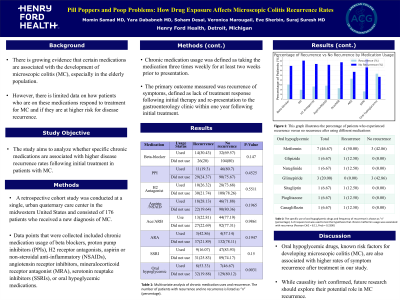Monday Poster Session
Category: Colon
P1942 - Pill Poppers and Poop Problems: How Drug Exposure Affects Microscopic Colitis Recurrence Rates
Monday, October 28, 2024
10:30 AM - 4:00 PM ET
Location: Exhibit Hall E

Has Audio

Momin Samad, MD
Henry Ford Hospital
Rochester Hills, MI
Presenting Author(s)
Momin Samad, MD1, Soham Desai, 2, Veronica Marougail, 3, Eve Sherbin, 4, Abdulmalik Saleem, MD5, Yara JN. Dababneh, MD5, Suraj Suresh, MD5
1Henry Ford Hospital, Rochester Hills, MI; 2Wayne State University, Detroit, MI; 3Wayne State School of Medicine, Detroit, MI; 4Wayne State University School of Medicine, Detroit, MI; 5Henry Ford Health, Detroit, MI
Introduction: There is growing evidence that certain medications are associated with the development of microscopic colitis (MC), especially in the elderly population. However, there is limited data on how patients who are on these medications respond to treatment for MC and if they are at higher risk for disease recurrence. The study aims to analyze whether specific chronic medications are associated with higher disease recurrence rates following initial treatment in patients with MC.
Methods: A retrospective cohort study was conducted at a single, urban quaternary care center in the midwestern United States and consisted of 176 patients who received a new diagnosis of MC. Data points that were collected included chronic medication usage of beta blockers, proton pump inhibitors (PPIs), H2 receptor antagonists, aspirin or non-steroidal anti-inflammatory (NSAIDs), angiotensin receptor inhibitors, mineralocorticoid receptor antagonist (MRA), serotonin reuptake inhibitors (SSRIs), or oral hypoglycemic medications. Chronic medication usage was defined as taking the medication three times weekly for at least two weeks prior to presentation. The primary outcome measured was recurrence of symptoms, defined as lack of treatment response following initial therapy and re-presentation to the gastroenterology clinic within one year following initial treatment.
Results: A univariate analysis of chronic medications and recurrence revealed a significant association between use of oral hypoglycemic medications and increased MC recurrence rates (Table 1). 15 patients from the cohort used oral hypoglycemic medications. A subgroup analysis revealed the most common drug used in this class was Metformin. However, Metformin was not independently associated with recurrence in patients treated for MC.
Discussion: Although oral hypoglycemic drugs have been previously shown to be a risk factor in development of MC, our study demonstrates that this class of medications is also associated with higher rates of symptom recurrence following an initial treatment course. While this does not necessarily establish a cause-effect relationship, future studies should focus on the proposed potential pharmacologic risk factors of oral hypoglycemic drugs on MC recurrence.
Note: The table for this abstract can be viewed in the ePoster Gallery section of the ACG 2024 ePoster Site or in The American Journal of Gastroenterology's abstract supplement issue, both of which will be available starting October 27, 2024.
Disclosures:
Momin Samad, MD1, Soham Desai, 2, Veronica Marougail, 3, Eve Sherbin, 4, Abdulmalik Saleem, MD5, Yara JN. Dababneh, MD5, Suraj Suresh, MD5. P1942 - Pill Poppers and Poop Problems: How Drug Exposure Affects Microscopic Colitis Recurrence Rates, ACG 2024 Annual Scientific Meeting Abstracts. Philadelphia, PA: American College of Gastroenterology.
1Henry Ford Hospital, Rochester Hills, MI; 2Wayne State University, Detroit, MI; 3Wayne State School of Medicine, Detroit, MI; 4Wayne State University School of Medicine, Detroit, MI; 5Henry Ford Health, Detroit, MI
Introduction: There is growing evidence that certain medications are associated with the development of microscopic colitis (MC), especially in the elderly population. However, there is limited data on how patients who are on these medications respond to treatment for MC and if they are at higher risk for disease recurrence. The study aims to analyze whether specific chronic medications are associated with higher disease recurrence rates following initial treatment in patients with MC.
Methods: A retrospective cohort study was conducted at a single, urban quaternary care center in the midwestern United States and consisted of 176 patients who received a new diagnosis of MC. Data points that were collected included chronic medication usage of beta blockers, proton pump inhibitors (PPIs), H2 receptor antagonists, aspirin or non-steroidal anti-inflammatory (NSAIDs), angiotensin receptor inhibitors, mineralocorticoid receptor antagonist (MRA), serotonin reuptake inhibitors (SSRIs), or oral hypoglycemic medications. Chronic medication usage was defined as taking the medication three times weekly for at least two weeks prior to presentation. The primary outcome measured was recurrence of symptoms, defined as lack of treatment response following initial therapy and re-presentation to the gastroenterology clinic within one year following initial treatment.
Results: A univariate analysis of chronic medications and recurrence revealed a significant association between use of oral hypoglycemic medications and increased MC recurrence rates (Table 1). 15 patients from the cohort used oral hypoglycemic medications. A subgroup analysis revealed the most common drug used in this class was Metformin. However, Metformin was not independently associated with recurrence in patients treated for MC.
Discussion: Although oral hypoglycemic drugs have been previously shown to be a risk factor in development of MC, our study demonstrates that this class of medications is also associated with higher rates of symptom recurrence following an initial treatment course. While this does not necessarily establish a cause-effect relationship, future studies should focus on the proposed potential pharmacologic risk factors of oral hypoglycemic drugs on MC recurrence.
Note: The table for this abstract can be viewed in the ePoster Gallery section of the ACG 2024 ePoster Site or in The American Journal of Gastroenterology's abstract supplement issue, both of which will be available starting October 27, 2024.
Disclosures:
Momin Samad indicated no relevant financial relationships.
Soham Desai indicated no relevant financial relationships.
Veronica Marougail indicated no relevant financial relationships.
Eve Sherbin indicated no relevant financial relationships.
Abdulmalik Saleem indicated no relevant financial relationships.
Yara Dababneh indicated no relevant financial relationships.
Suraj Suresh indicated no relevant financial relationships.
Momin Samad, MD1, Soham Desai, 2, Veronica Marougail, 3, Eve Sherbin, 4, Abdulmalik Saleem, MD5, Yara JN. Dababneh, MD5, Suraj Suresh, MD5. P1942 - Pill Poppers and Poop Problems: How Drug Exposure Affects Microscopic Colitis Recurrence Rates, ACG 2024 Annual Scientific Meeting Abstracts. Philadelphia, PA: American College of Gastroenterology.
